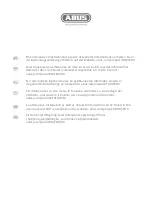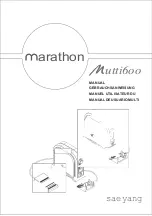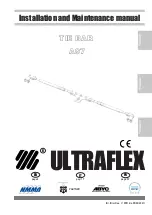
31
Changing the place of pin 1, see Fig. 31, will produce a change in closing moment. The scale above the
slot, 10-5-0, is equivalent to the application depth in centimeters. Pin 2 limits the machine lifting height by
closing the valve when the machine is lifted high enough.
The tow-bar (meaning the tractor tow-bar height) is adjusted so that the machine travels in its sowing
position horizontally. The length of the towing device push-bar can also be adjusted. If the machine is
equipped with a tow-bar with a hydraulic push-bar (recommended, for example with rollers), this can be
used to adjust the fertilizer depth. The cylinder in question is actuated by a separate hydraulic valve on the
tractor. This function is in completely independent of the machine’s raising/lowering circuit. Increasing the
push-bar length raises the fertilizer coulters correspondingly. Adjustments of this kind can be necessary,
for example on soft ground. It is recommended not to raise the roller, but rather to adjust it using the push-
bar.
Adjusting the fertilizer application depth
Adjustments must be performed in the field or on soft ground in order to enable the fertilizer coulters to
press into the ground. Adjust pin 1, see Fig. 31, and center this on the desired placement level (along the
10-5-0 cm scale).
Lower the machine while driving forward. Stop the tractor once the machine has lowered. Do not allow the
tractor to move backwards, so as not to block the coulters. Check the correct position of the machine. The
machine must be horizontal. Adjust as required using the tow-bar push-bar adjustment screw or by raising
or lowering the tractor tow-bars.
If the machine working position is in the field direction and the towing device push-bar does not require
adjustment, the fertilizer application depth can be measured. Application depth is measured from the
sowing track by digging up visible fertilizer grains. During the measurement, you can also define the seed
sowing depth, see Section 15.
If the fertilizer application depth is incorrect, change the adjustment and perform a new test. Application
depth changes depend somewhat on the fill of the machine, ground type etc. The effect of these factors
can be reduced by measuring application depths under different conditions and by adjusting the machine
application depth according to an average value. Variations of a few centimetres in the fertilizer application
depth are permissible without having a major impact on the crop.
15. Adjusting the sowing depth
General
Correct sowing depth is one of the most important factors influencing sprouting. In a JC-type
machine, sowing is carried out at the moist bottom of the tillage layer. The best guarantee of
successful sowing is correctly performed tillage. Tillage must be performed in a properly timed
manner such that the crumb size in the tillage layer is adequately refined. Excessive tillage can
cause a risk of smudging or crusting.
Tillage should be performed to the intended sowing depth. Sowing depths should be selected based on
the sowed plant and ground humidity conditions. With small seeds, the correct sowing depth is 1-3 cm
based on the sowed plant and ground humidity conditions. The sowing depth between grains may vary
between 2.5-5 cm. As with all plants, it is essential that sowing is performed on humid, level ground in
order to ensure sprouting. Become acquainted with the conditions appropriate for different plants and their
sowing depths with the help of guides and study materials.
The tractor must be equipped with wheels suitable to ensure that the surface pressure remains low enough
to avoid compression or tire grooves. The use of additional devices to condense the area of the roller or
between the tractor wheels is recommended. This will ensure even sprouting across the entire working
width.















































